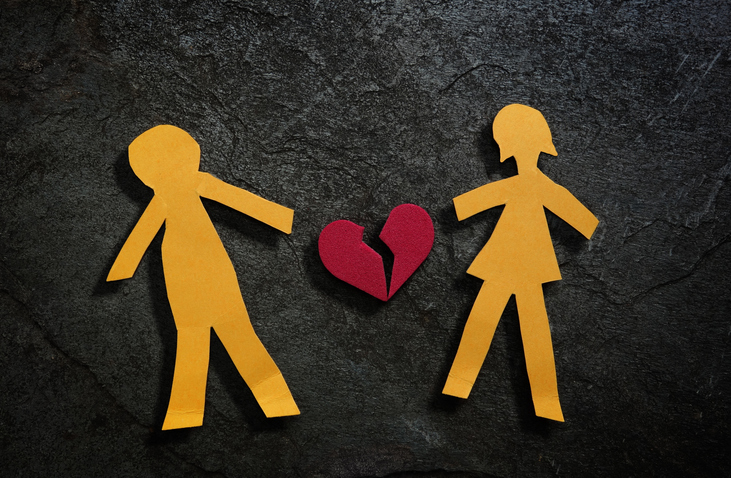
Any breakup—whether it was the slow and painful end of a seven-year marriage or the sudden crash of a six-week fling—can be hard on both your emotions and your health. That feeling you feel in your stomach or that little ache you feel in your heart is real. Here are other real physical changes your body goes through during and after a breakup.
1. You go into fight-or-flight mode (muscles get sore).
Fight-or-flight is a biological phenomena that has your body dispatch massive levels of the stress hormones adrenaline and cortisol in reaction to threatening or stressful occurrences. But it can actually do more harm than good when it kicks in and you don't really "need" the biological responses, your body is suddenly producing. Having a surplus of these hormones when you're actually not in physical danger can wreak havoc on the system, causing you to suffer from sore muscles that swell up from a massive cortisol release that isn't followed by your body springing into physical action afterward.
2. Your Sex Drive Declines
Although you might think that a quick hookup would be the cure for your broken heart, due to your emotional pain, your sex drive is temporarily on hold. Unless you've been cheating on your significant other or haven't seen that persons in awhile, you won’t feel much like seeking out your next romantic partner. This could be a good thing in order to deal with healing of your heart and other issues that led to the breakup in the first place.
3. You Overcompensate for dopamine withdrawal.
You are going through withdrawal from the neurotransmitters that make you feel happy. Dopamine, oxytocin and serotonin levels are all higher when you are in love. When you go through a breakup, your body feels more physical pain than before due to decreased oxytocin levels.

4. Your brain's reward center is stimulated.
Even though after a breakup you have less dopamine, the feel-good hormone that stimulates your brain’s pleasure center, your brain still activates the reward center. Researchers in the Journal of Neurophysiology found that the brain’s ‘mesolimbic reward/survival systems are involved in romantic passion regardless of whether one is happily or unhappily in love.’
5. Your digestive system slows down.
Again, your hormones are to blame: "Cortisol shooting into your system during your break up diverts blood away from your digestive track, leaving you with GI [gastrointestinal] unpleasantness," explains MSNBC's Jennifer Nelson. And according to a 1994 study, stress can even affect the distribution of fat, since cortisol promotes the settling of fat particularly in your abdominal region.
6. Your immune system gets weak.
When going through a traumatic breakup, your immune system will take a nosedive. “Stress almost immediately affects your immune system — you get colds and the flu,” explains Hall. She adds that autoimmune diseases, in which the body turns against itself, can possibly occur after a divorce or breakup of a longtime relationship, and your immune functioning can be compromised.
The American Psychological Association adds that depression caused by a breakup, induced social isolation, and feelings of loneliness can all contribute to a weakened immune system. The Huffington Post also points out that there is an extensive body of research that shows just how much our emotional well-being can impact our immune systems.
7. Your heart grows larger than its normal size.
When you are going through a breakup, your heart actually enlarges temporarily in a condition identified by The American Heart Association as broken heart syndrome, which can lead to real cardiovascular consequences.
Signs of broken heart syndrome include chest pain and an irregular heartbeat, and it is sometimes misdiagnosed as a heart attack.
The good news is, it usually clears up within a few weeks, but the bad news is, it can lead to short-term heart muscle failure.








